Due to lax local management, many people who bought cheap, planned agricultural land to build houses had their homes demolished without compensation, leaving them homeless.
On the morning of October 21st, Mr. Dang Van Mui, 56 years old, covered three motorbikes and a refrigerator with tarpaulins to protect them from the rain in his 100-square-meter house located in an alley off Ho Van Long Street, Tan Tao Ward, Binh Tan District. Because it was built on land designated for a green park, Mr. Mui's house had to be demolished three weeks prior.
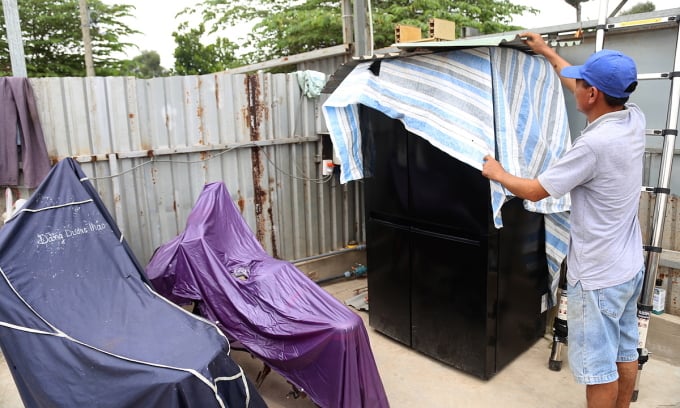
Mr. Mui covered some of his belongings with tarpaulins as his illegally constructed 100-square-meter house was being demolished. Photo: Dinh Van
The old, single-story house is now just a pile of rubble, with dozens of corrugated iron sheets stacked on the tiled floor. The five members of Mr. Mui's family have to set up a temporary tent in front of their house before moving to a new place. Mr. Mui recounted that in 2018, he and his wife spent 518 million VND, accumulated over many years, to buy a 20-meter-long, 5-meter-wide rice paddy plot of land, transacting with a handwritten agreement. This location is only 25 meters from Binh Tan High School and half a kilometer from Vo Tran Chi Street.
At the time, Mr. Mui thought he had bought the land at a bargain price because a 45 m2 apartment 100 m away cost nearly 700 million VND. After buying the land, he built a small temporary house without obtaining a building permit. In 2019, he spent nearly one billion VND building a house, but after a few months, he was reprimanded by the authorities.
"My family has been attached to this house for a long time, and we don't have enough money right now, so we can't move to a new place," Mr. Mui said.
Twenty meters away, 50-year-old Pham Van Phuong also set up a makeshift shelter to cook, wash clothes, and sleep after his small house was demolished due to construction violations. Hoping to escape his cramped rented accommodation, he borrowed money from relatives to buy a 70-square-meter plot of land for nearly 300 million VND to build a house at the end of 2018.
At that time, this plot of land was divided into 21 smaller lots, transferred via handwritten agreements. The road leading to the area was only wide enough for two motorbikes to pass each other. "My wife and I have been selling goods on the street and living in rented rooms for nearly two decades, so we longed to own a house in Saigon," he said. The house was completed in 2019, and the authorities came to remind us and posted notices of construction violations, but they did not immediately order its demolition.
A few months ago, the family received a notice requiring them to demolish the house. By mid-October, the house had been torn down. According to the 50-year-old man, due to a lack of understanding of the regulations and a failure to be warned beforehand, the family had built a solid house and lived there for many years without thinking that the authorities would one day force them to relocate.
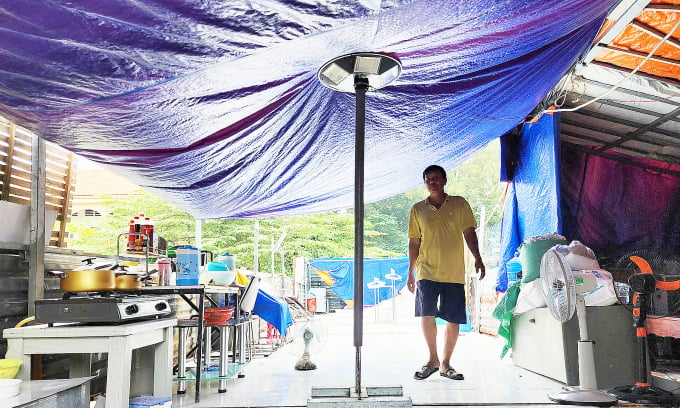
Mr. Phuong's family put up tarpaulins to cover their kitchen and sleeping area to live temporarily after their house was demolished. Photo: Dinh Van
The families of Mr. Mui and Mr. Phuong are two of approximately 150 illegally constructed houses in the alleys of Ho Van Long Street, Provincial Road 10 in Tan Tao Ward, that must be demolished and the original state restored.
According to a representative of the Tan Tao Ward People's Committee, most of the houses in violation of regulations were built in late 2019. At that time, local authorities lacked close supervision, leading many people to build houses on land designated for perennial crops, parks, and green spaces. To date, approximately 60 houses have been demolished, and the remaining houses will be demolished by the authorities in November, while also assisting disadvantaged households in finding new housing.
Speaking to VnExpress , Mr. Nguyen Minh Nhut, Chairman of the People's Committee of Binh Tan District, said that when violations were discovered, the local authorities reminded and encouraged the residents to dismantle the illegal structures, but did not take firm action, allowing the violations to drag on for many years. This was partly because the management officials saw that the violating households were poor and struggling, and the residents pleaded to rectify the situation themselves, so they "relented" and gave them more time.
Furthermore, when one house is built illegally but not dealt with strictly, it leads to many other households following suit. Mr. Nhut cited the case of the plot of land behind Binh Tan High School as an example; initially, only a few households built houses, but before the issue was resolved, it led to 21 households violating the regulations.
Furthermore, in many cases, people buy cheap land, preferring to live in houses and land, accepting the risk of buying land that doesn't conform to planning regulations, leading to difficulties in obtaining construction permits. They then devise ways to circumvent this. Initially, they only erect a corrugated iron fence around the land, then build an inner wall and add a roof to create a small, single-story house to live in.
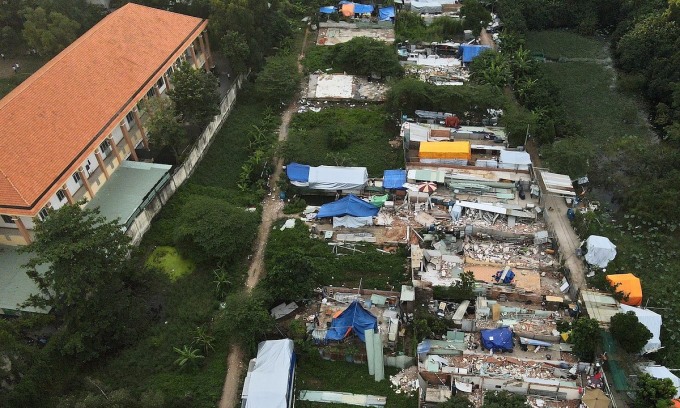
Twenty-one illegally constructed houses were demolished in mid-October in Tan Tao ward, Binh Tan district. Photo: Thanh Tung
To mitigate this situation, Binh Tan District has strengthened management and utilized information technology and aerial photography equipment to prevent violations. The district has also directed wards with many land areas affected by planning regulations and at high risk of illegal construction on agricultural land to focus on inspection and monitoring.
For land plots eligible for conversion to construction purposes, relevant agencies will provide maximum support to people with the procedures. "People must obtain permits before building and should not buy land to build houses in areas that do not conform to the planning regulations to ensure their rights and avoid problems later," Mr. Nhut said.
Illegal construction on agricultural land and planned land is a problem in many localities in the city. In July 2019, the Ho Chi Minh City Party Committee issued Directive 23 to rectify and improve the effectiveness of construction management.
According to a report by the Ho Chi Minh City Department of Construction, after nearly four years of implementing Directive 23, the total number of construction violations in the city is nearly 2,700, a decrease of 78.5% compared to the average number of violations before the directive was issued. In the first six months of this year alone, the total number of violations was 170, averaging 0.9 violations per day, a decrease of 89.2%.
According to lawyer Do Truc Lam (Managing Director of Lam Tri Viet Law Firm), Decree 91 imposes fines ranging from 6 million to 400 million VND and requires the restoration of the original state for houses built on agricultural land without permission from the state authorities. "When building houses on planned land without proper authorization, people are at a disadvantage and face many difficulties later," Mr. Lam said.
Dinh Van
Source link




![[Photo] Prime Minister Pham Minh Chinh attends the Conference summarizing and implementing tasks of the judicial sector.](/_next/image?url=https%3A%2F%2Fvphoto.vietnam.vn%2Fthumb%2F1200x675%2Fvietnam%2Fresource%2FIMAGE%2F2025%2F12%2F13%2F1765616082148_dsc-5565-jpg.webp&w=3840&q=75)



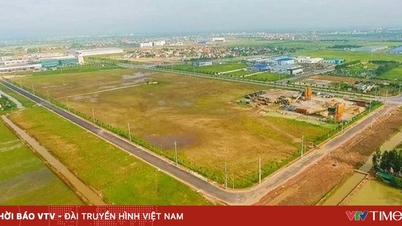

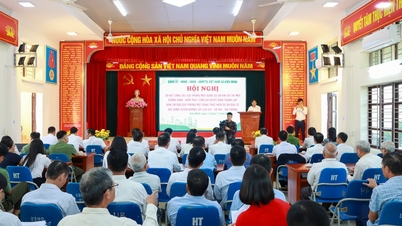




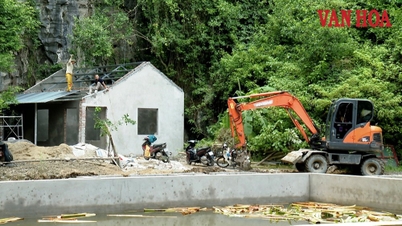

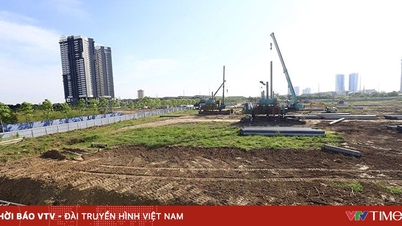





























































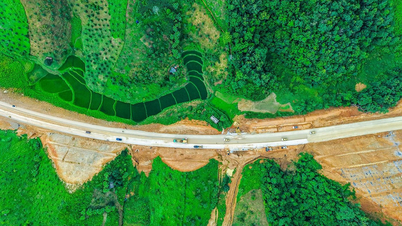
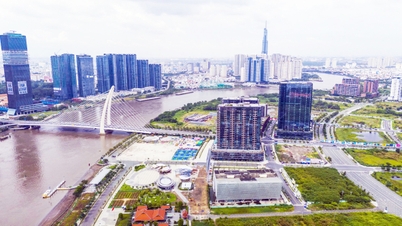












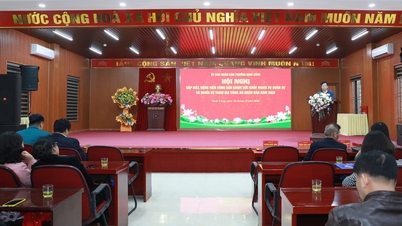

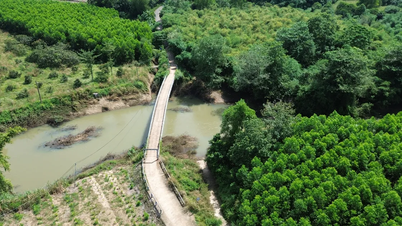



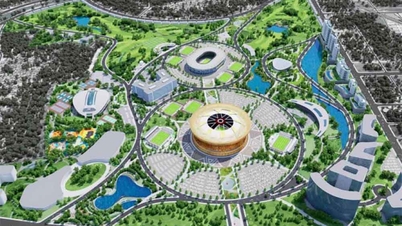














Comment (0)